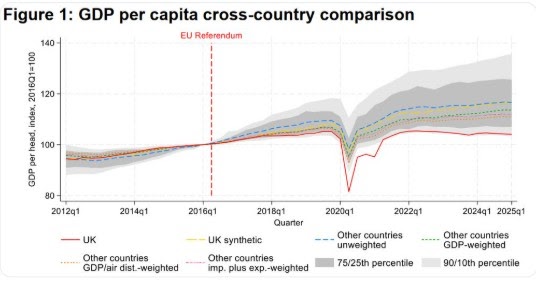
In my last post
about the prospect of Labour breaking its tax pledge, I did something
I don’t often do, which is indulge in some ‘I told you so’s.
In doing this I was reminded that there was one other major criticism I
had of Labour’s initial economic strategy besides their
underestimation of how much taxes they would need to raise, and that
was their position on Brexit. Labour’s basic position on Brexit is
that it has ruled out not only rejoining the EU, but also joining its
single market, or even its customs union.
It should be said
that there are important discussions going on that will ease the
cost of Brexit in specific ways that are important to particular
areas of the economy. But these initiatives, even if the EU plays
ball, will not amount to very much in terms of the aggregate economy.
It remains the case that if Labour want to undo the economic damage
caused by Brexit in a significant way, they need to either rejoin the
EU’s customs union or its single market (or both).
Labour’s rhetoric
towards the EU is also a lot more friendly than their predecessors.
Rhetoric is important, particularly in countering the populism of the
right. It remains the case that one of the most potent attack lines
Labour and other political parties have against both Reform and the
Conservatives is that these are the parties that brought us Brexit.
It is potent because
most voters, including many Conservative and Reform supporters, think
Brexit has failed the economy. A recent
YouGov poll showed that only 11% of voters thought
that Brexit had so far been more of a success, while 62% thought it
had been more of a failure. Even among either Conservative or Reform
voters, more thought it had so far been a failure than thought
it had been a success. According to the
same poll, the main reason for this verdict is an
accurate belief that Brexit has damaged the economy.
Yet even in terms of
rhetoric, Labour’s position is still not as strong as it could be.
This is because Labour continue to talk in a vague way about the
Brexit deal that the Conservatives did, rather than the basics of
Brexit itself. Rachel Reeves recently talked about a “rushed and
ill-conceived Brexit”. That is fine in attacking the Conservatives,
but it allows Farage a simple get out clause, which is that it wasn’t
his deal but Boris Johnson’s. Labour cannot respond by saying
Farage also wanted to leave the EU’s customs union and single
market and that is what has caused most of the economic damage,
because Labour also appear committed to exactly that type of Brexit deal.
In policy terms, it
is very hypocritical of Labour to say that it focused on growth, and
at the same time ignore two policy changes that would have a really substantial positive effect to promote growth. Of course both Starmer
and Reeves know this. The eventual 4% reduction in GDP assumed by the
OBR is well known, but over two years ago I
noted that work
by John Springford implied that 4% was an underestimate.
A new
NBER working paper suggests the same, saying that
productivity may already be 4% lower than it would have been without
Brexit, and GDP 6-8% lower. This chart helps show why that might be
the case (HT@davidheniguk.bsky.social).
The reason Labour
have ruled out rejoining the EU’s customs union and single market
is not because they discount the economic benefits of doing so, but
because they (and/or their political advisers) believe that to do
either would be politically dangerous for Labour.
There are two
reasons why it might be politically dangerous, and it is important to
distinguish between the two. The first is that voters would not
appreciate the government spending time and energy embarking on a
major negotiation with the EU, and the internal debate that this
would provoke, so soon after the years in which tBrexit appeared to
paralyse UK politics. The second is that rejoining the EU’s customs
union and single market, although perhaps popular with most voters,
would still upset some of its own (2024) voters in key Labour
constituencies (e.g. the red wall).
If the first reason
was the most important, then Labour could be honest with voters and
simply say that now is not the time. By saying sometime but not now,
Labour could also be honest about the damage being outside the EU’s
customs union and single market is doing. Many may not agree that the
time is not right to make such a major step back towards being part
of the EU, but at least the conversation would be about when, not if,
and the costs of delay could be discussed more explicitly.
However I suspect
the second reason is more important for Labour. This is just one
part, albeit a very important part, of their conviction that they
must on all accounts not upset socially conservative Labour voters.
It goes hand in hand with adopting much of the right’s rhetoric, as
well as adopting pointlessly cruel or harmful policies, on
immigration. This, at least as much as the tax pledge, is this
government’s
original sin.
Should Labour see
Brexit as part of their attitude to socially conservative voters, or
is there something in addition which is special about Brexit? A good
way to answer this question is to listen to Anand
Menon’s recent masterly talk
on the subject. But a key point must be that there has been a rise in
right wing populism around the world, including
Europe.
This strongly suggests that Brexit was essentially a manifestation of
this growing popularity, rather than a cause of it. Whether you view
this rise as due
to the economic consequences of neoliberalism
or not, Brexit can be seen as just one of the many manifestations of
the growing popularity of right wing populism.
As I and almost
everyone else has said repeatedly over the last several months,
Labour’s strategy (the McSweeney/Blue Labour strategy)
of adopting populist right positions on socially
conservative issues might have been sensible in opposition but it
does not work for Labour in government. When in opposition, most
social liberals would still vote Labour where it mattered because the
primary goal was to defeat the Conservative government, and in most
constituencies Labour were best placed to do that. Now that they are
in government, Labour taking socially conservative positions worries
social liberals much more, which is one reason why Welsh nationalists
replaced Labour in a recent by-election and why the Greens are
advancing in the polls.
.
While this is the
general reason why Labour’s current stance on Brexit is untenable,
there are two specifics that relate to their Brexit pledge. The first
is the size of the boost to growth that either joining the EU’s customs union or single market would give. This is likely to be bigger than anything else this
government could do to increase living standards. Once again, the
fact that Labour are now in government rather than opposition is
critical. To see the importance of incumbency on voter decisions,
look at the swing from Trump in 2024 to the Democrats in recent
elections, a
swing that is all about the economy. A little of that
swing may be due to Trump’s tariffs, but fundamentally it is that the cost of
living remains a problem, and voters blame whoever is in government
for that.
The second specific
reason Labour’s Brexit position is untenable is that, like the tax
pledge, it was very likely to constrain Labour not just after the
2024 election, but in future elections as well. Using the last Labour
government as an example, Labour were always likely to find it harder
to get elected the longer they were in government. If this is the
case, both the Brexit pledge and the tax pledge would in effect bind
Labour until they got voted out of government, because the electoral
arguments for making these commitments would only increase over time.
For both tax and
Brexit this is an impossible position for Labour to put themselves
into. With tax, because health costs trend up over time (as they have
done in almost every country over the last few decades) and with a
commitment to increase defense spending as a share of GDP, major
taxes just have to rise at some point over the next decade [1], even
if you ignore the arguments for increased public spending now.
Equally with Brexit
simple
demographics mean that the number of voters who are
opposed to Brexit will only increase over time. As a result, Labour’s
pledge not to fundamentally alter the terms of Brexit is not tenable
over the next decade. Labour, and to be honest much of the country,
are in desperate need of stronger economic growth right now, and so
it would make sense [2] for Labour to follow the abandonment of their tax
pledge with initiating discussions on how Great Britain could rejoin
the EU’s customs union. [3]
[1] The best way of trying to reduce this upward trend is to spend more on preventative health, as the IPPR argues here. However that takes a lot of investment and is unlikely to yield quick benefits.
[2] Of course it making sense does not mean that it is what Labour will do. It is Labour’s fiscal rule that is forcing it to (probably) break its tax pledge. With Brexit there is nothing similar to overcome a misguided strategy and force Labour’s hand.
[3] As I
argued here, it makes sense in political terms to
rejoin the EU’s customs union before its single market.
Source link





